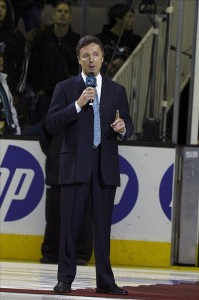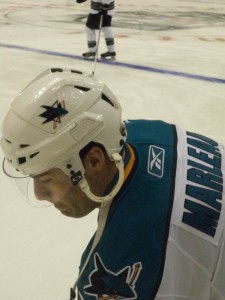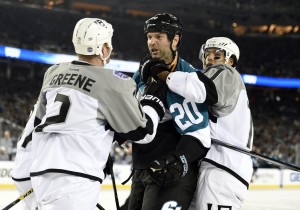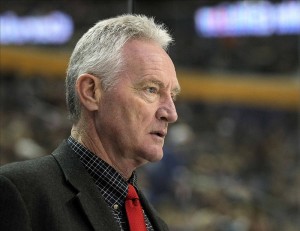What a season for the San Jose Sharks. For the most part, not in a good way. There is much ground to cover in order to review the season. News is bound to come out in the next few days and weeks regarding the future of certain players, coaches and management. Who knows, maybe even broadcasters. I’ll roll this review out over 8 articles. This is the first and it will cover the main points. Here is the subject list for the articles that will be in my season review:
- Main Points
- Forwards
- Defense
- Goalie
- The Roster and the Cap
- Coach
- GM and Owner
- Summary
It’d Be Nice to Start with Highlights, But …
This was a bad season that did not need to be bad. The Sharks streak of 10 consecutive playoff appearances came to an end this year, the team finished with 22 fewer points compared to the prior season. Tied for the league’s 4th highest point total last year, the Sharks tumbled into the bottom 10, finishing tied for 22nd with Columbus.

Doug Wilson’s pronouncement that this season would be a step back did not require the team to play poor hockey. The month of February was a complete disaster, winless at home and only 3 wins overall. For good teams, February is ‘go time’. For the Sharks, it was the time the team collapsed.
The team failed on a variety of levels. The culture change put in place will be a major subject until a culture of success comes to San Jose. The problem is that the current culture was put in place by the owner, Hasso Plattner. When the problem is the owner, you have major problems. It is one thing to take a step back, it is another to have portions of the organization in open conflict with other parts. Losing became acceptable, and that is unacceptable.
If there was a theme for this season, it was dysfunction. I won’t go over these incident by incident, or decision by decision, Shark fans are already familiar enough with them. For those who feel a need to revisit some of these, just click away on any of these hyperlinks: bad decision, bad decision, strange decision, nasty words, top 10 list.
The longer-term prospects for the San Jose Sharks are as murky as they have been in a long time. Even the San Jose part may not be long-term. Which may have something to do with all that has seemingly gone wrong this season.
There was a darkness to this season that goes beyond the record.
On The Ice

In the prior season, the Sharks had substantial contributions from Patrick Marleau and Joe Thornton. These 2 players make up roughly 20% of the payroll. Both have 2 more years on their contracts. Both contracts have ‘no movement’ clauses. Last season they were a combined +20, this year a combined -21. While Thornton still passed the eyeball test, Marleau didn’t. If the Sharks see a decline in these two players and they stay until their deals expire, it is hard to imagine a near-term turn around. A lot of the Sharks offense still goes through Joe Thornton.
Some people want to believe the Sharks have youth and depth coming to the rescue. Well maybe. It is instructive that the Sharks finished the season with 13 forwards on their roster, one a 29-year-old who played in his first NHL game in the second to last game of the year. Two others are John Scott and Mike Brown. Does that sound like youth and depth?
The defense was a major weakness this year. The Sharks played 11 different defensemen (not counting Scott, who played 1 game as an emergency d-man in the final game of the year). The defense finished the year with at least as many questions as answers. One of the 11, Jason Demers, was traded to the Stars. Of the 10 that remained with the Sharks organization, there are questions about the majority of them. Should Brent Burns remain on defense? Should Matt Irwin be re-signed? Or for that matter, Brenden Dillon or Scott Hannan or Taylor Fedun or Karl Stollery? All are free agents. The only thing on defense that seems clear coming out of this season is the top pair of Marc-Edouard Vlasic and Justin Braun.
Goalie is another open question. Antti Niemi did not do enough to warrant being retained while Alex Stalock did not do enough to warrant a starting job. Niemi’s deal is up, Stalock has another year. The Sharks have a bunch of options, none jump out and shout ‘solution’.
Managing the Team
The questions about the coach and general manager will be among the first that get sorted out in this offseason. It was clear that the two, Todd McLellan and Doug Wilson respectively, were not on the same page on several key items. One area they did agree on: playing young players. Two newcomers made significant strides and look to have bright futures, Melker Karlsson and Chris Tierney. The Sharks used 16 players this year with less than 82 games of NHL experience coming into this season. 9 of the 16 were given substantial playing opportunities.

As a corollary to the team’s attempted youth movement, the Sharks made no major veteran acquisitions, either via trade or free agency, in the past year. The highest salaried acquisition was 4th line forward Ben Smith. There was no effort to improve this team by acquiring anyone with a significant NHL resume. The Sharks did, however, dump nearly 25% of their payroll last summer, with the departure of 3 highly paid players. Two departed via trade and one via buyout.
Injuries were a non-factor, the Sharks were relatively healthy over the course of the season. The Sharks had an unusually large number of road games near the start of the season. A quarter of the way into the season, they had played only 5 homes games. The long road stretch was handled reasonably well. It should have set the team up for a great run in the middle of the year, with 33 of the next 48 games at home. The team’s home record, usually pretty sweet, turned sour this season. The Sharks managed just 19 home wins in 41 games, compared to 29 home wins in the prior season. The Sharks record was deserved. Things like the schedule, puck luck, officiating, health etc. were not significant contributors to the team’s struggles this year.
Less Special
For years, the Sharks had a reputation as a physical team. This year, that diminished, especially upfront. An example came in the season finale, where the Sharks were vastly outhit by Los Angeles. In quantity, the difference was big. In quality, the difference was substantially bigger. For the Sharks to keep up in the west, physical play across all lines will need to return.
Special teams deserve a mention. The power play, strong last year, was actually stronger this year, registering 5 more goals (55 total) on fewer opportunities. The penalty kill however, was a different story. The Sharks gave up a net of just 25 goals last season (33 goals allowed offset by 8 short-handed scores). That was 2nd best in the league. This year, that number ballooned to 44 goals, 19th in the league. The decline had nothing to do with the number of short-handed situations the team faced, that number was virtually unchanged from last year to this one.
Three Noteworthy Debuts and a Legend’s Swan Song

I would be remiss if I did not include some highlights. Troy Grosenick and Bryan Lerg both came up huge in their respective NHL debuts. A 45 save shutout for goalie Grosenick early in the season and a game-winning goal for Lerg with just minutes to go in the season’s penultimate game. Both players had their family in the stands, cameras shots showed the families fighting back tears of joy. A different sort of debut came in the form of outdoor hockey at Levi’s Stadium in nearby Santa Clara. Except for the final score, it was a great night for hockey in this area. Even in a year to forget, there were moments to savor.
I hate burying this comment so deep in the article, but it has to be mentioned. Larry Robinson, the living legend, has made it clear he is going to step away from the Sharks and the NHL, at least in any major role. Robinson said the final games behind the bench this season were his ‘swan song’. He indicated he would be spending most of his time in Florida and enjoying his family. When a person of Robinson’s stature steps away from the game, it needs to be respected. Many felt hiring Robinson was among the best moves the Sharks made in recent years. And while I’d like you to finish reading this article, Robinson’s interview with Curtis Pashelka is worth reading. If indeed this is Robinson’s swan song, both the Sharks and the entire league will be poorer for it.
The Bottom Line

On the business side of things, it is worth noting the Sharks lengthy sell-out streak ended this year, and numerous games fell short of selling out. Most games, the announced attendance was close to capacity. Looking around the venue some nights might have given one a different impression, as there were often a substantial number of empty seats. The player payroll was also substantially below the salary cap. These two things might be related.
For the season, the key takeaway is straightforward. After years of being competent and typically among the NHL’s better teams, these attributes disappeared in a blazing show of dysfunction. Where the issues lie are less straightforward. Principle blame has been cast in many directions: upon the owner (my view), the GM (seems to be the majority view), the coach, the top players and all the way down to the lowest paid veteran on the team, John Scott. Over the course of these next several articles, I’ll spell out the good, the bad and the ugly. For this season’s Sharks, there has been plenty of each.